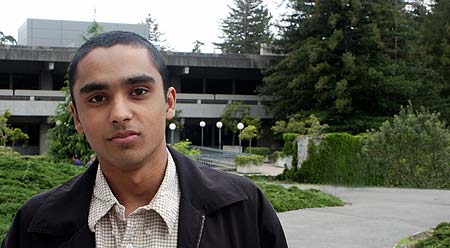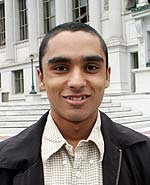 |
Imran Farooq, founder of OMNI (BAP photos) |
The accidental activist:
Freshman Imran Farooq brings an eye for business to new environmental
group
BERKELEY - Imran Farooq doesn't come off as your typical environmental activist, and that's fine with him. This soft-spoken first-year UC Berkeley student from Riverside, CA, intends to major in business, and along the way change the way most people think of conservation. As the founder of a new campus group, the Organization for Maintaining Natural Interests (OMNI), Farooq doesn't exhort his fellow students to "save the rainforest." Instead, he says, "we just want to give people firsthand experience and let them make up their own minds."
 April
23 Earth Day events April
23 Earth Day eventsCelebrate Earth Day 2003 starting at 11 a.m. with these activities on Sproul Plaza ... |
Sound vague? If Farooq were any other freshman, one might question whether OMNI was just a résumé-padding hobby that might never get off the ground. Yet Farooq has a track record. Back when he was just a high-school junior in Riverside, Farooq raised enough money to take a group of oceanography students to the Galapagos Islands for 17 days, where they worked with researchers from the Charles Darwin Research Station to study penguins, cormorants, and the lowly sea cucumber.
Galapagos travels
The funny thing is, he wasn't even part of the class that first conceived of the trip to the Galapagos Islands. The students who were in it asked him to lead what would later become known as the Global Student Education Project because they thought Farooq - a varsity athlete in three sports (football, track, and tennis), the student representative to the Board of Education, and an active community volunteer - might have the skills to pull it off.
 'I tell people that it's not as glamorous as dolphins or whales, but saving the sea cucumber is just as important.' -Imran Farooq
|
"They just wanted to do a small trip, essentially just go there," he recalls. "At first I was skeptical at the plausibility of the project, but then I realized the potential." Farooq says it was a chance to inspire his fellow students. "For the area we all grew up in, it was kind of shocking that students would even try to do something as ambitious as raising that much money for a research trip. I wanted to help."
With Farooq involved, the group expanded its goal to include assisting the Darwin Research Station with its ongoing conservation projects. They sold candles and candy, washed cars, and networked every connection, including the school's district supervisor, to raise money. By July 2001, they had raised an astonishing $58,000: enough to send 12 students and five adults to the protected archipelago for 17 days, where they learned how to scuba dive and count sea cucumber populations, as well as monitor how fishermen's practices near sensitive marine areas affected penguin and cormorant populations.
Save the cukes
For Farooq, the trip was an eye-opener. Up until that point, he hadn't thought much about conservation, but in the islands he learned many lessons about ecosystem dynamics. Sea cucumbers, for example, are considered a delicacy in some Asian cultures, and that has led to their overharvesting. "They provide nutrients at the ocean floor, and that balance affects things all the way up the food chain," Farooq explains. "I tell people that it's not as glamorous as dolphins or whales, but saving the sea cucumber is just as important."
He came back determined to reach out to other non-science-oriented students. The Galapagos project was recognized by the Sea World Environmental Education Excellence Awards with a $10,000 grant to continue the program, which the high school used to fund another trip, this time to Florida. Meanwhile, Farooq and another student, Carlos Uribe, founded OMNI during their senior year of high school. Uribe is keeping the Southern California chapter going while Farooq works on the UC Berkeley pilot chapter.
"I think in our society, environmentalism is not really considered mainstream," Farooq says. "So when I went on this trip and saw these atrocities, like people killing animals for a single part and leaving the rest to rot, I started thinking about how the only way something like that can change is through the youth of the world, through changing the culture. That's why OMNI uses the tagline 'Expanding your culture of thought.'"
By changing the culture, Farooq means not only broadening the idea of who can be an environmentalist, but also reaching out to activists' traditional opponents. "Many environmental groups feel that corporations and politicians in general are the enemy," he says, choosing his words very carefully, "but in fact in the system we live in, working with them is the best means for improving the environment and health. It's not effective to chain ourselves to trees. There are definitely ways within the system that we can achieve greater change."
OMNIpotent
A pragmatist, Farooq seems to already know how to navigate the system. He has filed for nonprofit status for OMNI, to make it more attractive to potential donors, and he has been hard at work introducing himself and the group to influential people on campus. His seriousness has impressed Christina Maslach, the Vice Provost of Undergraduate Education, and in a few weeks he has an appointment with Haas School of Business Dean Tom Campbell. OMNI has a slick Web site (www.omni-inc.org) where the staff have titles like "Head of Ambassador Relations" and "Assistant Director of Operations." Farooq has appointed the publicity-savvy Ankur Luthra, UC Berkeley's latest Rhodes Scholar, as a director, and Luthra has begun tapping his extensive network of contacts.
In addition to the South Africa trip in the works, Farooq talks about hosting a conference at UC Berkeley next year in which the political, economic, and environmental components of the conservation movement could meet to discuss their differences, and mentions several prominent activists who have told him they'd be willing to participate.
The verdict is still out, but OMNI may turn out to be a significant grassroots student movement. Farooq explains that he wants to get the group running smoothly at Berkeley before expanding OMNI to university campuses around the United States and eventually, internationally.
"Of course everyone is in favor of the environment," he says. "But until the environment is embedded in our lives and consciousnesses as something really important that affects all of our futures, we're not going to be able to change anything."

